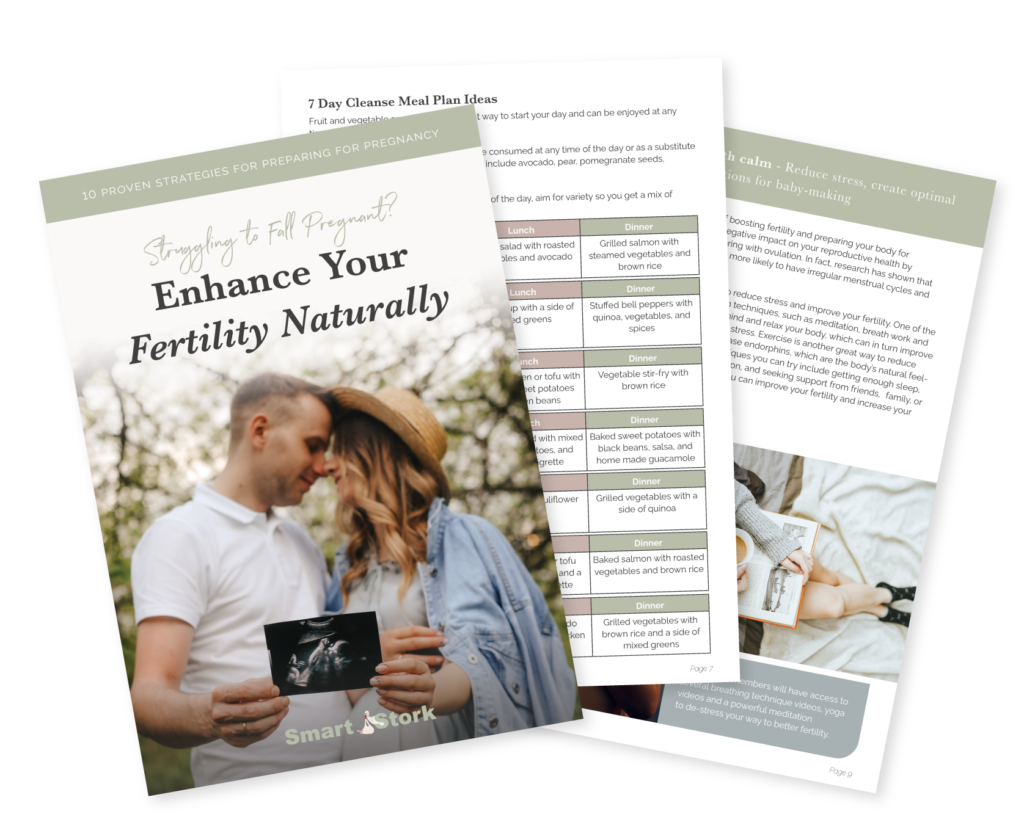Polycystic ovarian syndrome (PCOS) is a common hormonal disorder that affects women of reproductive age. It is characterized by the presence of multiple cysts in the ovaries, along with symptoms such as irregular menstrual periods, elevated androgen levels, and insulin resistance.
Polycystic ovary syndrome (PCOS) can affect a woman’s menstrual cycle and fertility in several ways:
- Irregular menstrual cycles: Women with PCOS often have irregular menstrual cycles or may miss periods altogether due to hormonal imbalances. This can make it difficult to predict when ovulation will occur, which can affect fertility.
- Anovulation: PCOS is often associated with anovulation, which is the lack of ovulation. When ovulation does not occur, the body does not produce enough of the hormone progesterone, which is needed to regulate the menstrual cycle and maintain a pregnancy.
- Hormonal imbalances: Women with PCOS often have elevated levels of androgens, male hormones that are produced in the ovaries and estrogen dominance. These hormonal imbalances can interfere with ovulation and lead to infertility.
- Insulin resistance: Women with PCOS are often insulin resistant, which means that the body does not respond effectively to insulin, the hormone responsible for regulating blood sugar levels. Insulin resistance can lead to an increase in insulin levels and affect ovulation, making it difficult to conceive.
PCOS can make it more challenging to become pregnant, but it is not always a cause of infertility. With proper treatment and management, many women with PCOS are able to conceive and carry a pregnancy to term.
While there is no known cure for PCOS, however there are several natural treatments that can help manage its symptoms and improve overall health:
- Diet: A balanced and nutritious diet that is low in refined carbohydrates and high in fiber can help regulate blood sugar levels and improve insulin sensitivity. Eating a variety of whole foods, such as fruits, vegetables, whole grains, and lean protein, can also provide the nutrients your body needs to support overall health. Follow the 80/20 rule – 80% raw and cooked vegetables (and fresh fruits) and 20% everything else.
- Exercise: Regular physical activity, such as brisk walking or cycling, can help regulate hormones, improve insulin sensitivity, and reduce symptoms of anxiety and depression. Aim for at least 30 minutes of moderate exercise most days of the week.
- Herbs and supplements: Some herbs and supplements, such as inositol and spearmint, may have a positive impact on insulin sensitivity and hormone levels. However, it’s important to consult with a healthcare professional before starting any new herbal remedy to ensure that it is safe and appropriate for you.
- Stress management: Chronic stress can have a negative impact on hormone levels and worsen symptoms of PCOS. Engaging in stress-reducing activities, such as mindfulness meditation, yoga, or deep breathing, can help manage stress and improve overall health.
- Herbs: Here are a few of my favorites to consider adding to your daily routine
- Cinnamon: Cinnamon has been shown to improve insulin sensitivity and help lower blood sugar levels. It contains compounds that may mimic the effects of insulin and enhance glucose uptake into cells.
- Fenugreek: Fenugreek seeds are rich in fiber and certain compounds that may help improve insulin sensitivity and lower blood sugar levels. Some studies suggest that fenugreek supplementation may have positive effects on glycemic control.
- Gymnema Sylvestre: Gymnema is believed to have anti-diabetic properties and may help reduce sugar cravings. It may also help improve insulin production and sensitivity.
- Berberine: While not exactly an herb (it’s a compound found in various plants), berberine has been shown to have potential benefits for insulin sensitivity and blood sugar control. It works by activating an enzyme that helps regulate glucose metabolism.
- Turmeric: Curcumin, the active compound in turmeric, has anti-inflammatory and antioxidant properties. Some research suggests it may have a positive impact on insulin sensitivity and may help lower blood sugar levels.
- Bitter Melon: Bitter melon is a vegetable that is often used in traditional medicine for its potential anti-diabetic effects. It may help improve insulin sensitivity and reduce blood sugar levels.
- Ginseng: Both American ginseng and Asian ginseng have been studied for their potential effects on blood sugar regulation and insulin sensitivity.
- Aloe Vera: Aloe vera gel and extract have been investigated for their potential role in improving insulin sensitivity and reducing blood sugar levels.
- Holy Basil (Tulsi): Holy basil has been suggested to have anti-diabetic effects and may help improve insulin sensitivity. It is also known for its adaptogenic properties that may help manage stress.
- Chromium: While not an herb, chromium is a mineral often included in discussions about blood sugar control. It is found in trace amounts in some herbs and may help enhance insulin sensitivity. Remember, individual responses to these herbs can vary, and they are not a substitute for medical treatment. If you’re considering using any of these herbs for health purposes, it’s important to consult with a healthcare professional to ensure they are safe and appropriate for your specific situation.

Certain herbs have been suggested to have potential effects on reducing estrogen levels in the body. It’s important to approach the use of these herbs with caution and under the guidance of a healthcare professional, as altering hormone levels can have significant effects on health. Here are some herbs that have been studied for their potential to reduce estrogen:
- Chaste Tree Berry (Vitex agnus-castus): Also known as chasteberry or monk’s pepper, this herb is commonly used to help balance hormones, including reducing excess estrogen. It may have a regulatory effect on the menstrual cycle and hormonal fluctuations.
- White Peony Root (Paeonia lactiflora): White peony root is used in traditional medicine to address hormonal imbalances. It is believed to have anti-estrogenic effects and may help modulate estrogen levels.
- Black Cohosh (Actaea racemosa): Black cohosh is often used to alleviate menopausal symptoms. While it may not directly reduce estrogen levels, it is believed to have estrogen-modulating effects and may help alleviate symptoms associated with high estrogen.
- Maca Root (Lepidium meyenii): Maca root is an adaptogenic herb that may help balance hormones. While it is not necessarily an estrogen-reducing herb, it may help support hormonal balance in the body.
- Turmeric (Curcuma longa): Curcumin, the active compound in turmeric, has been suggested to have anti-estrogenic effects. It may help regulate estrogen metabolism and reduce the activity of estrogen receptors.
- Flaxseed (Linum usitatissimum): Flaxseeds contain lignans, which are compounds that may have weak estrogen-blocking effects. They are also rich in fiber and healthy fats, which can support hormone balance.
- Licorice Root (Glycyrrhiza glabra): Licorice root may have mild anti-estrogenic effects and is often used to support hormone balance. However, it should be used cautiously and for short periods, as excessive licorice consumption can lead to potassium imbalances.
- Red Clover (Trifolium pratense): Red clover contains compounds called isoflavones, which are similar in structure to estrogen. These isoflavones may have weak estrogenic effects and could potentially compete with natural estrogen for receptor binding.
It’s crucial to emphasize that reducing estrogen levels should be done under medical supervision and only if medically indicated. Hormone balance is a complex process, and altering it without proper guidance can lead to unintended health consequences. If you suspect you have hormonal imbalances, it’s best to consult with a healthcare professional who can recommend appropriate testing and treatment options tailored to your specific needs.
It’s important to remember that these natural treatments can complement, but not replace, conventional medical treatment for PCOS. A healthcare professional can help create an individualized treatment plan that addresses your specific needs and concerns.
The ability to conceive and carry a child is a precious and miraculous gift, every woman on the planet deserves to experience if she so desires.
I am dedicated to helping you achieve your dream of becoming a parent and am here to offer support, information, and resources to help you increase your fertility, choose the sex of your next baby or conceive twins naturally.
The journey to conception can be a difficult and emotional one. With a lack of information and support, couples are often left feeling helpless and overwhelmed. Let me help you find the missing piece in your fertility puzzle and get you back on the road to optimum fertility. Click here for more info on my 10 Proven Strategies to Enhance Your Fertility naturally.
So, whether you are just starting your fertility journey or have been trying to conceive for a while, I would like to help you navigate the process and find the best path forward for your unique situation. With my expertise and comprehensive approach to fertility, I am confident that I can help you achieve the healthy pregnancy and baby you desire.
Don’t let fertility struggles stand in the way of your dream of becoming a parent. There are many natural ways to boost your fertility and increase your chances of conceiving the baby of your dreams, that I believe should be explored before expensive medical interventions. Using natural methods to boost your fertility not only helps you improve your chances of conceiving, but it also allows you to take control of your reproductive health in a holistic, gentle way that honors your body and its natural processes.
If you are serious about trying to conceive a baby, what you have been doing isn’t working and you’re tired of riding the emotional roller-coaster then its time to make a decision to do something different. While you could continue to try the same thing each month, it’s important to ask yourself how long you’re willing to persist before trying new strategies and techniques that may increase your chances of success?
Don’t waste another precious cycle, have a look at our 10 Tips to Enhance Your Fertility Naturally E-book

Join me on Facebook, I look forward to seeing you over at the all new Smart Stork Fertility Sisterhood facebook group for positive messages to keep you moving in the right direction.
Thank you for choosing Smart Stork as a resource for your fertility journey.





